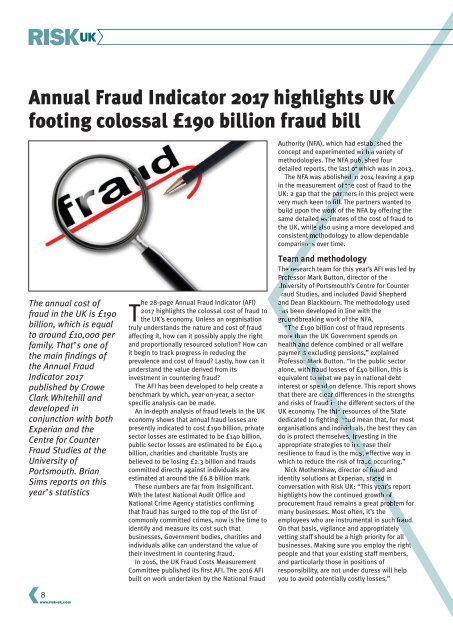RiskUKDecember2017
Create successful ePaper yourself
Turn your PDF publications into a flip-book with our unique Google optimized e-Paper software.
Annual Fraud Indicator 2017 highlights UK<br />
footing colossal £190 billion fraud bill<br />
Authority (NFA), which had established the<br />
concept and experimented with a variety of<br />
methodologies. The NFA published four<br />
detailed reports, the last of which was in 2013.<br />
The NFA was abolished in 2014 leaving a gap<br />
in the measurement of the cost of fraud to the<br />
UK: a gap that the partners in this project were<br />
very much keen to fill. The partners wanted to<br />
build upon the work of the NFA by offering the<br />
same detailed estimates of the cost of fraud to<br />
the UK, while also using a more developed and<br />
consistent methodology to allow dependable<br />
comparisons over time.<br />
The annual cost of<br />
fraud in the UK is £190<br />
billion, which is equal<br />
to around £10,000 per<br />
family. That’s one of<br />
the main findings of<br />
the Annual Fraud<br />
Indicator 2017<br />
published by Crowe<br />
Clark Whitehill and<br />
developed in<br />
conjunction with both<br />
Experian and the<br />
Centre for Counter<br />
Fraud Studies at the<br />
University of<br />
Portsmouth. Brian<br />
Sims reports on this<br />
year’s statistics<br />
The 28-page Annual Fraud Indicator (AFI)<br />
2017 highlights the colossal cost of fraud to<br />
the UK’s economy. Unless an organisation<br />
truly understands the nature and cost of fraud<br />
affecting it, how can it possibly apply the right<br />
and proportionally resourced solution? How can<br />
it begin to track progress in reducing the<br />
prevalence and cost of fraud? Lastly, how can it<br />
understand the value derived from its<br />
investment in countering fraud?<br />
The AFI has been developed to help create a<br />
benchmark by which, year-on-year, a sectorspecific<br />
analysis can be made.<br />
An in-depth analysis of fraud levels in the UK<br />
economy shows that annual fraud losses are<br />
presently indicated to cost £190 billion, private<br />
sector losses are estimated to be £140 billion,<br />
public sector losses are estimated to be £40.4<br />
billion, charities and charitable Trusts are<br />
believed to be losing £2.3 billion and frauds<br />
committed directly against individuals are<br />
estimated at around the £6.8 billion mark.<br />
These numbers are far from insignificant.<br />
With the latest National Audit Office and<br />
National Crime Agency statistics confirming<br />
that fraud has surged to the top of the list of<br />
commonly committed crimes, now is the time to<br />
identify and measure its cost such that<br />
businesses, Government bodies, charities and<br />
individuals alike can understand the value of<br />
their investment in countering fraud.<br />
In 2016, the UK Fraud Costs Measurement<br />
Committee published its first AFI. The 2016 AFI<br />
built on work undertaken by the National Fraud<br />
Team and methodology<br />
The research team for this year’s AFI was led by<br />
Professor Mark Button, director of the<br />
University of Portsmouth’s Centre for Counter<br />
Fraud Studies, and included David Shepherd<br />
and Dean Blackbourn. The methodology used<br />
has been developed in line with the<br />
groundbreaking work of the NFA.<br />
“The £190 billion cost of fraud represents<br />
more than the UK Government spends on<br />
health and defence combined or all welfare<br />
payments excluding pensions,” explained<br />
Professor Mark Button. “In the public sector<br />
alone, with fraud losses of £40 billion, this is<br />
equivalent to what we pay in national debt<br />
interest or spend on defence. This report shows<br />
that there are clear differences in the strengths<br />
and risks of fraud in the different sectors of the<br />
UK economy. The thin resources of the State<br />
dedicated to fighting fraud mean that, for most<br />
organisations and individuals, the best they can<br />
do is protect themselves. Investing in the<br />
appropriate strategies to increase their<br />
resilience to fraud is the most effective way in<br />
which to reduce the risk of fraud occurring.”<br />
Nick Mothershaw, director of fraud and<br />
identity solutions at Experian, stated in<br />
conversation with Risk UK: “This year’s report<br />
highlights how the continued growth of<br />
procurement fraud remains a great problem for<br />
many businesses. Most often, it’s the<br />
employees who are instrumental in such fraud.<br />
On that basis, vigilance and appropriately<br />
vetting staff should be a high priority for all<br />
businesses. Making sure you employ the right<br />
people and that your existing staff members,<br />
and particularly those in positions of<br />
responsibility, are not under duress will help<br />
you to avoid potentially costly losses.”<br />
8<br />
www.risk-uk.com

















